This is the first in a three-part series on Gallup's findings regarding the differences between men and women in their religious views and practices.
From the early stand-up comedy of Bill Cosby, to the best-selling book, Men Are From Mars, Women Are From Venus, Americans have been fascinated with exploring the differences between men and women. In more than 45 years of polling, Gallup has uncovered some substantial, and perhaps surprising, differences between men and women's religious views and practices. This series will examine some of those differences and conclude by suggesting how religious leaders can effectively reach both men and women.
In some of Gallup's most recent polling, women score significantly higher than men in five categories: the importance of religion in their lives, church/synagogue membership and attendance, the belief that religion can answer most of today's problems, the role of God in their personal decision-making, and weekly Bible reading and group Bible study.
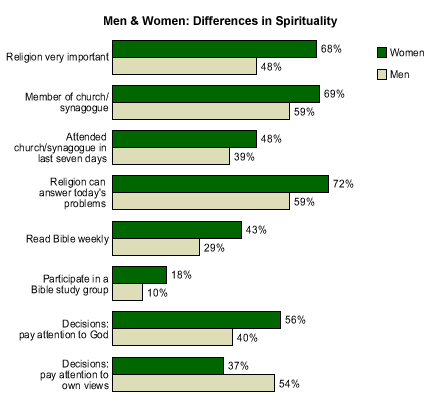
The Importance of Religion
When asked in March 2002, "How important would you say religion is in your own life," 68% of women responded "very important," while only 48% of men did so. These results are illustrative of the gap in stated importance between men and women, which is usually at least 10 percentage points. This persistent gap may reflect men's reluctance to explore their inner selves, or a tendency to be more skeptical of the aspects of society that have less tangible, easily identifiable results.
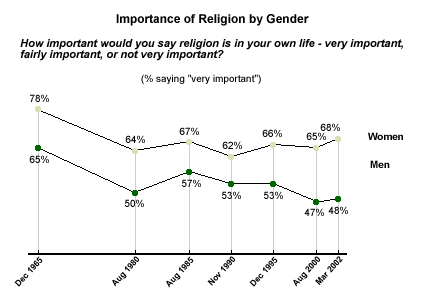
Church/Synagogue Membership and Attendance
Women are more likely than men to be members of a congregation (69% vs. 59%) and are more likely to have attended a religious service in the last 7 days (48% vs. 39%). Evidently, religious congregations appeal more to women than men both in terms of simple belonging and active participation.
Weekly attendance at religious services among women reached a high of 50% in 1954, and then dropped to 43% by 1980. Since 1980, female attendance has risen slightly, to 48% in 2002. Male attendance saw a similar decline from 42% in 1954 to 34% in 1980, but jumped from 33% in 1985 to 39% in 1990, and has been fairly steady since then. Interestingly, men's attendance increased at about the same time as preparations were being made for the Persian Gulf War, suggesting the possibility that men, more so than women, feel the need for a religious consciousness during times of war.
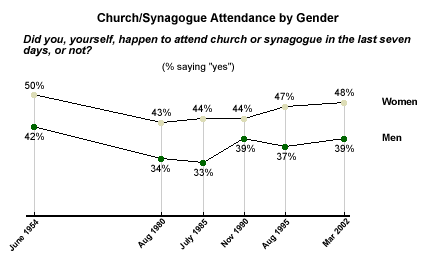
Religion's Relevance
Nearly three-fourths of women (72%) believe that religion can answer all or most of today's problems, compared with 59% of men. The difference between men and women on this issue has been relatively consistent for 45 years. In 1957, 75% of men and 86% of women believed that religion could solve most or all of today's problems. That percentage plunged in 1974, to 54% for men and 70% for women, and dropped to 50% for men in 1985. However, it has been on an upswing for men since then, while women's opinions on this subject have fluctuated between a low of 65% and high of 72%.
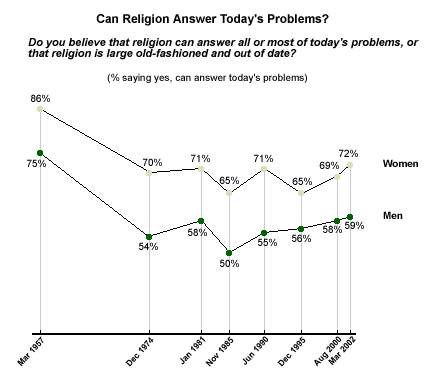
The Bible
Women are far more likely than men to read the Bible at least daily and weekly (43% vs. 29%), and are almost twice as likely to participate in a Bible study group (18% vs.10%). The gender gap in weekly Bible reading has been fairly consistent since 1978, as the trend for men closely mirrors that for women.
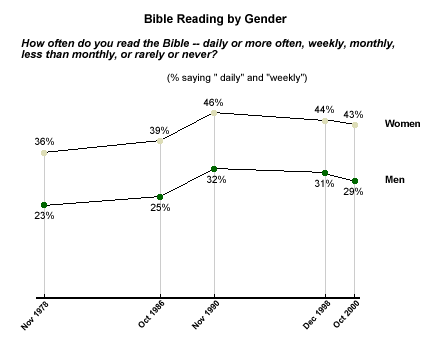
Key Points
It appears that religious institutions have been doing a better job of reaching women than men. If leaders want to improve the spiritual lives of men in their faith communities, the old methods won't work -- because they haven't for nearly 50 years.
Next week's article will examine the differences between men and women in congregational life.
